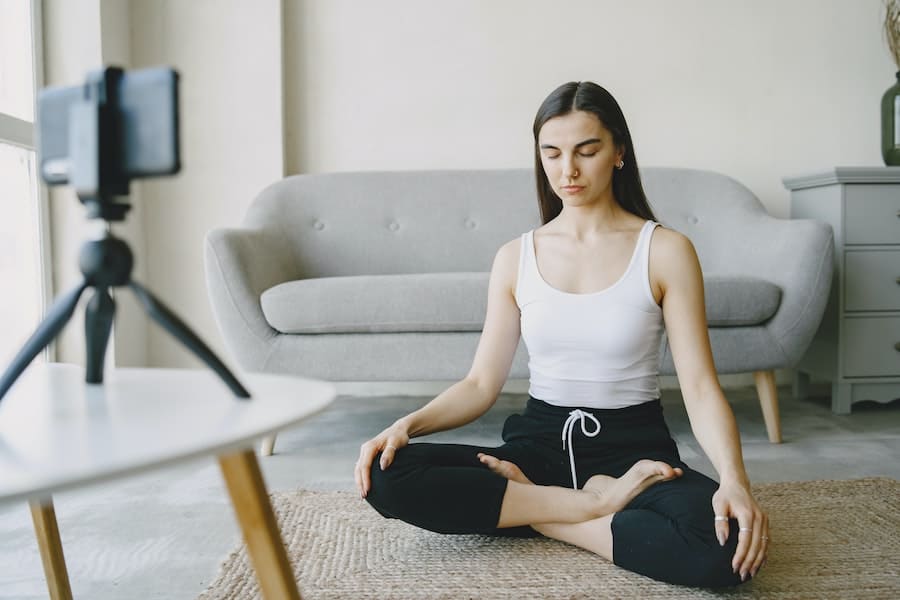We’re going to dive into ways you can implement self-improvement tips. But first, let’s make sure we’re on the same page about what self-improvement actually is and answer the question: What is self-improvement? Self-improvement is the process of enhancing your mental, physical, emotional, and behavioral patterns in order to increase your quality of life and achieve your goals. In the big picture, it’s your intentional, positive, evolution over time. As a creator, this can be crucial to achieving your business goals and to help you overcome imposture syndrome.
How to set self-improvement goals
While having an overall vision of how you want to feel or what you want to experience in your life is essential, it’s only the first step in creating sustainable change in improving your life. Setting self-improvement goals creates a structure for bettering yourself.
Deciding where you want to improve
So it’s important to first take stock of your life to determine what things you need or want to work on. This is no small task. So it’s helpful to decide which areas of your life you want to review. Rate your satisfaction in those categories. Some areas you might choose to review include physical health and wellness, career, finances, personal and romantic relationships, and emotional and mental well-being. Maybe you think big picture and want to evaluate your overall contributions to society. This last category can also be looked at through the lens of how fulfilled you are with your business, job, or role as a creator. Maybe the next step is helping others through coaching or through online courses.
Take your time with this, especially if it feels overwhelming. It’s not uncommon to realize that you might not be fully satisfied in many areas of your life. And if you do realize that it could be coming as a surprise. Self-growth sometimes requires us to take some hard looks in the mirror.
So let this exercise of taking stock be a process of collecting data rather than something to feel down about. Don’t get caught thinking that you’re “behind” in life or not doing a good enough job. Keep your abundance mentality while doing this exercise and setting your goals.

Setting your focus
Choose one to three areas of your life that you’d like to focus on. Pay attention to the areas that you are currently the least satisfied with, these can be a great place to start. While it might seem tempting to make a lot of goals for every area, it’s probably not sustainable.
All of the areas of our life are connected and overlap. With this in mind, you can trust that improvements you make in one area will positively affect other areas too. For example, if you’re focusing on physical health and making steady improvements, it’s highly likely that your emotional and mental well-being will also increase without you specifically focusing on or setting a goal for that area.
Get clear on what improvements you’d like to see in the areas you chose. To do so, you might ask yourself the following questions:
- How do you want to feel?
- Where do you want to be?
- What impact do you want to make?
- How much money is in your bank account?
- What are your financial goals?
- What is the quality and depth of your relationships with others, and with yourself?
- In what realistic time frame do you envision these changes taking place?
As you ask yourself these questions, get clear on why you desire to experience these shifts in your life. Having a solid purpose for the effort you’re putting in is crucial for the longevity of taking action to create the improvements you’re working towards. Once you have this down, it’s time to create a plan.

How to improve yourself every day: Self-improvement plan
Having a daily self-improvement plan can be a game-changer when it comes to development. Big shifts and breakthroughs don’t just miraculously happen overnight. Rather, they’re a culmination of baby steps and smaller intentional actions that add up to something big. This is also optimal in terms of how the brain works when it comes to creating healthier habits. Taking smaller actions each day and increasing the time and effort spent on a certain habit builds over time.
To achieve the answers to the questions above, consider setting SMART goals for yourself that are measurable and achievable. Start small—if you’re looking to improve your finances, then perhaps you set a goal to put $20 a week into a Roth IRA. While it might be tempting to commit to $100 a week this can be an unsustainable goal. Instead, contributing a smaller amount means it takes less effort on your part to restructure your budget or radically change your lifestyle to accommodate this new goal, at least in the beginning stages.
It’s important in this process to have accountability—both for metrics and for celebrating your continued progress of self-growth. Use a calendar or spreadsheet to track your progress, and have preset milestones to check in with yourself. For example, if you’re working within a year’s timeframe, schedule check-ins to review your progress every quarter or more.
Working with daily goals is also helpful for feeling a sense of reward. Each time you complete a task your brain releases dopamine, making you feel good. Having a plan where you have micro goals each day is the perfect way to work on yourself and make continued progress without getting overwhelmed.
Some examples of micro goals include:
- Drinking a glass of water upon waking up
- Setting aside five minutes a day to learn a new language
- Meditating for ten minutes
- Getting outside between meetings or computer time
The idea is to implement actions that don’t radically change your normal day-to-day. This allows the neural networks to build as the new habit forms, and over time you can increase the time spent doing each activity. Or you can even expand the activities as you progress.

Self-improvement tips and ideas
While small shifts can create big change, it’s also oftentimes the most obvious shifts that can accelerate your progress as you work on yourself. You may already know that drinking more water is optimal for your health. But are you actually implementing it? Read the following tips with an open mind. While you do, take honest stock of where you could take more action around each one.
Surround yourself with people who inspire and uplift you
You’ve probably heard that you’re the sum of the five people you spend the most time with. That is to say, your mindset, beliefs, mannerisms, and perspective are all heavily influenced by those around you. So pay attention to the people you spend the most time with. And ask yourself if their presence is supporting your personal improvement. If not, it’s a great opportunity to get clear on boundaries.
Keep in mind, this also goes for the TV shows, movies, podcasts, books, and social media you’re consuming. Ensure the people you’re with in real life and via technology align with your self-improvement goals. Spend time consuming content from, and with, other creators who inspire you and who you aspire to emulate with your own business.

Take care of your physical self
The power of feeling well-rested and energized throughout the day cannot be overstated. Your physical body being rested and healthy is the foundation for everything else. When you feel better, you can do better.
Consider tracking your sleep to get an idea of how rested you are. To do this you can use a device like a Fitbit, Apple watch, or Oura ring, or even use apps like “Sleep Cycle” on your phone. These can bring more awareness and intentionality to this crucial wellness factor. Implement good sleep hygiene too. It can be tempting as a creator to be on your phone until bedtime but studies show that can seriously disrupt your sleep. Consider putting your phone down an hour before bed, opting for a self-improvement book instead.
In addition to getting enough sleep, drinking enough water can sometimes be a goal some of us miss. Our bodies are predominantly made of water, so it goes without saying that you need to be well-hydrated. If you drink caffeine or have an occasional alcoholic drink, it’s especially important that you’re consuming enough water to keep your body running optimally.
Lastly, make sure you’re getting some movement every day. Being a creator can sometimes be sedentary. It leads to looking at screens for a long time and usually involves quite a bit of sitting. So make sure you’re taking breaks from looking at your screens. Maybe introduce blue-light glasses. And get outside once a day for a walk or jog if you can. On days when it’s not optimal to go outside, consider doing some yoga or meditation to bring you some peace.
Seek experiences outside of your comfort zone
Getting outside of your comfort zone is one of the biggest indicators of growth taking place. The more you go outside your comfort zone, the bigger the areas where you are comfortable. This means you’re able to do and experience more, growing along the way.
Keep in mind, going outside your comfort zone doesn’t mean you have to bungee jump or partake in a public speaking seminar (although you could.) Sometimes, going outside of our comfort zone can be something as simple as making eye contact with someone at the store or on a walk and smiling at them. Or it could mean sharing an authentically vulnerable post on social media. Notice when you’re doing something that feels uncomfortable, and lean into that feeling.
Staying in integrity with yourself
The relationship you have with yourself and the trust you have for yourself is incredibly important. Making promises or telling yourself that you’ll do something, like going to the gym after work, and then not doing it creates a sense of distrust within the self.
This distrust makes it a lot more challenging to implement new habits on your self-improvement journey. Because you’ve already set the precedent that you might not see those new habits through. Or even a feeling that it’s not possible for you to create a new habit.
Start to value your own word with yourself as gold. Staying in integrity with your promises and commitment to yourself will allow you to not only deepen your relationship with yourself, but it will also create a solid foundation for continuous, positive change. Share your commitments with a loved one or post about it on social media to help hold yourself accountable and organized if necessary. This can be a good way to get started with a new goal because you can have others check in on whether you’ve achieved your goal or stuck to your new habit.
Learn new skills
Exercising the brain and widening your repertoire of knowledge is a very expansive practice for being more productive. Adopt a growth mindset—the idea that your skills and abilities are able to be enhanced with practice—and dive into an online course or mentorship position to learn more about a certain area.
Taking the perspective of being a lifelong student will help you grow personally and professionally. Keep in mind that the end goal or result when it comes to learning a new skill is just as important as the process itself. It’s during the process of learning from mistakes, experimenting and trying new things that oftentimes we can glean the most lessons.

The best books, podcasts, and movies for improving your life
4 of the best self-improvement books
- “The Mountain is You” by Brianna Wiest – This potent book about overcoming the universal biggest obstacle standing in the way of massive self-improvement: yourself. It focuses on self-sabotage and how to overcome it.
- “You Are a Badass” by Jen Sincero – Easy to read and cleverly written, this book will convince you of your own greatness while learning to love all the parts of yourself, including reframing aspects that you may have disliked into assets.
- “Atomic Habits” by James Clear- Big changes come from small steps. This book gives the science-backed art of forming new helpful habits that will dramatically improve the quality of your life and how you show up in it.
- “The Life-Changing Magic of Tidying Up” by Marie Condo – Never underestimate the influence your outer environment has on your inner world. This is a quick but worthy read that will enable you to create a workspace and home that leaves space for you to feel focused, energized, and joyful.
4 of the best self-improvement podcasts
- “Life Kit” by NPR – Straight to the point and collected with a myriad of perspectives and studies, these quick podcasts are a double dose of self-improvement. They even have spin-offs that focus exclusively on health and money, too.
- “Unlocking Us with Brene Brown” – This podcast is a must if you’re looking to deepen your emotional awareness and improve your relationships overall. A heartfelt listen that’s backed by science.
- “Huberman Lab with Dr. Andrew Huberman” – Stanford professor and neuroscientist Dr. Huberman dives deep into the science behind why we do what we do, and how to optimize our behaviors and patterns of thinking. These are a long listen but they’re easy to chunk over the course of a couple of days.
- “Financial Feminist with Tori Dunlap” – Money is an essential tool for our overall well-being and continuous self-improvement. This podcast from Teachable creator Tori Dunlap goes through all the ins and outs of how you can improve your finances and set yourself up for success in the future without depriving or shaming yourself along the way. Bonus: She also just released a book!
4 of the best movies about self-improvement
- “The Mind, Explained” – This docu-series on Netflix gives a thorough explanation of the way our brains are rewired, and how to use that to your advantage. It’s informative and entertaining with engaging graphics and displays.
- “Minimalism” – A great perspective shift on focusing on the things that really matter, and getting rid of things that may be taking up unnecessary space in your life.
- “Becoming” – This documentary focuses on Michele Obama and her journey before and during being the first lady for eight years. Inspiring and with a powerful message, this film is sure to move you.
- “The Magic Pill” – Food can be medicinal and healing, or it can be detrimental to your physical and mental health. This film gives an in-depth look at different eating habits and fads, including the perspectives of doctors and medical professionals.
Join more than 150,000 creators who use Teachable to make a real impact and earn a real income.


